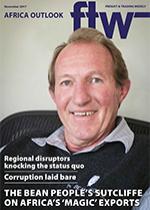African countries must reduce their dependence on China – not only in light of the Eastern giant’s economic slowdown but also in order to rebalance its economies to a more mature model. According to Dr Roelof Botha, economic adviser to PwC, China has relentlessly consolidated its position as Africa’s largest trading partner, a position that has been occupied since 2009. “Over the past eight years, import and export trade between Africa and China has been expanding by close to 20% per annum and this trend continued during the first half of 2017,” he told FTW. “However, a notable change has occurred in the composition of trade growth. In 2017, exports from Africa to China jumped by almost 50%, whilst imports from China grew at a subdued rate of only 3%. The strong growth trend for exports to China is obviously the result of a significant recovery of metal and mineral prices since 2016, especially coal and iron ore.” This might sound reasonably positive, but there were concerns, said Botha. “Using South Africa as a proxy, it remains a concern that Chinese imports of products that possess a high valueadded content are negligible. During the first seven months of the year, approximately 85% of Chinese imports from South Africa were represented by two categories only, namely minerals (mainly coal) and iron ore,” he explained. “A further concern is related to the enormous trade deficit between South Africa and China, namely more than R60 billion in the first seven months of the year. The ratio of South African exports to China to the trade deficit stands at close to 90%, compared to only 22% for Africa as a whole. It is fairly obvious that China has taken advantage of the size of South Africa’s private consumption market, with its exports of relatively cheap manufactured articles, including textiles, clothes, footwear and plastics, making life increasingly difficult for local manufacturers.” Furthermore, China’s new generation of industrial policies pose a new threat, not only to Africa, but also to high-income countries. Labelled “Made in China”, this strategy was aimed at a range of relatively advanced sectors, said Botha. Earlier this year, Chinese officials established more than 1 000 so-called “stateguided funds”, endowed with approximately $800 billion (more than double South Africa’s GDP), much of it for the ten sectors that comprise the “Made in China” strategy. According to the EU Chamber of Commerce in China, part of the plan is market-share targets, both at home and abroad, with literally hundreds of these having been identified. Botha said the Chinese government had also determined local-content targets for the various “Made in China” sectors. “These targets are regarded as contentious, as they illustrate a facet of Chinese industrial policy that has angered foreign companies and governments over many years, namely the disguising of state support,” he said. “African countries would do well to enhance intra-regional trade, particularly through the removal of barriers to trade and improvements to transport and communication modes. Border post surveillance and more efficient traffic flow management are also desperately needed.” According to Botha substantial scope exists in many African countries for import replacement of a host of basic manufactured products currently imported from China. Modest quotas could lead to the creation of jobs and ultimately also a broadening of the tax base in African countries, he said.
Chinese officials have established more than 1000 state-guided funds for the ‘Made in China’ strategy. – Dr Roelof Botha

